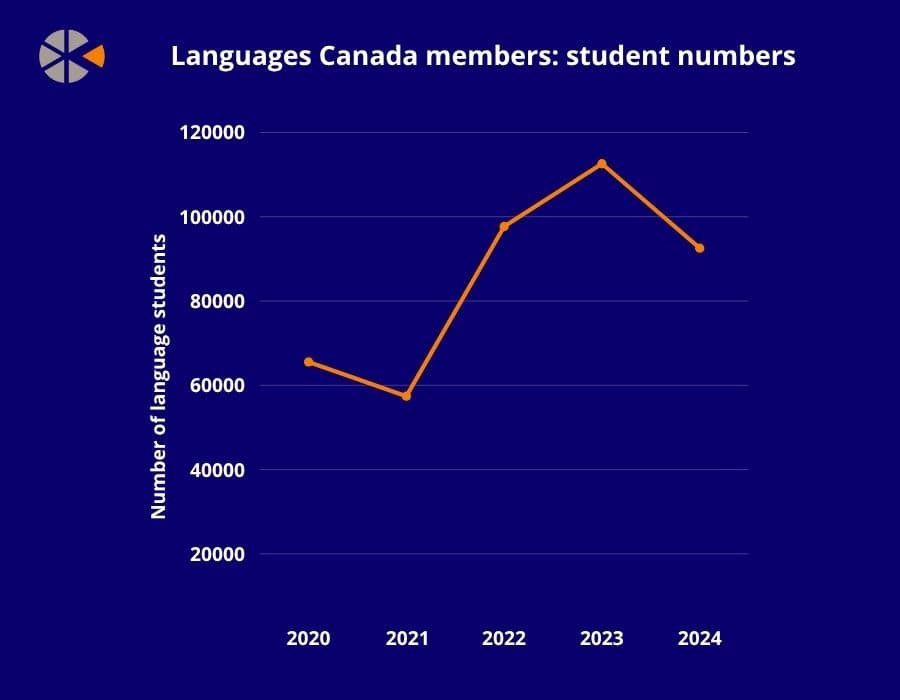Visa Policies Impact Canada’s Language Sector Growth
- The number of language-to-postsecondary pathways in Canada dropped by over half in 2024, raising concerns about its impact on the international education sector.
- Classrooms are feeling the absence of international language students, attributed to strict visa policies.
- In contrast, French language learning is thriving, with increasing enrolments as Canada welcomes more French-speaking newcomers.
The 2024 annual report from Languages Canada revealed a staggering 56% decline in language-to-postsecondary pathways. This unexpected drop has sparked worries about its ripple effect on student education in Canada.
According to Gonzalo Peralta, the executive director of Languages Canada, “Language education is often the first step in an international student’s journey to postsecondary studies and eventually to becoming a contributing member of Canadian society.” He further stated that when this initial step is hindered, it compromises the entire educational pathway, potentially reducing the number of qualified students entering higher education.
This decline has resulted in significant financial losses for educational institutions, with the economic contributions of language students plunging by 13% to CAD$1.04 billion in the past year. This decline disrupts not just classrooms but also local communities reliant on the vibrancy that international students bring, impacting tourism and cultural life.
“We’re not just losing tuition dollars; we’re losing the global connections and intercultural learning that strengthen our communities,” emphasized Peralta.

The introduction of study permit caps in January 2024 has further complicated matters, tarnishing Canada’s reputation as a destination for international students. “Once trust in a destination starts to erode, it’s hard to restore,” says Saurabh Malhotra, CEO of StudentDirect. “With the recent policy inconsistencies, Canada needs to ensure timely processing and approval rates.”
Anecdotal reports indicate that visa refusals, particularly for students from India, have reached their highest levels in the last decade. Delays in visa processing and uncertainty surrounding changing immigration policies exacerbate the situation.
The report did highlight a positive trend, with French language programs witnessing a 14% rise in enrolments, bolstered by Canada’s initiative to attract more French-speaking newcomers. These students not only address labour shortages in specific regions but also contribute to Canada’s bilingual identity, enriching regional development.
Notably, 82% of nearly 200 member schools identified visa refusals and shifting policies from the Immigration, Refugees and Citizenship Canada (IRCC) as their top challenges. Last year saw an 18% increase in students entering Canada with temporary resident visas (TRVs), which allow for stays of up to six months, although only 19% used study permits.
“Canada cannot afford to lose its position of trust and leadership in international education.”
Gonzalo Peralta, Languages Canada
In 2024, Asia replaced South America as the largest source region for students at member schools, with 42% coming from Asian nations. Despite a decrease overall, Japan maintained its standing as the largest source market, while countries like South Korea and Taiwan saw enrolments grow by 8% and 9%, respectively.
As the language education sector works towards recovery after 18 months of uncertainty, school leaders are advocating for increased stability. Peralta remains “optimistic” about potential improvements under the newly elected government of Mark Carney, who has signalled a newfound appreciation for international education.
He urges Minister Diab to recognize the critical role of language programs within the broader educational and immigration frameworks, seeking solutions that balance integrity and accessibility. If you’re interested in pursuing educational opportunities as part of your journey to Canada, you can explore options on our website, VisaJobsCanada.com, which provides helpful resources for international job seekers.
What do you think?
Have a question about this topic or your own plans to move to Canada? Scroll down and leave a comment. We’d love to hear from you.

